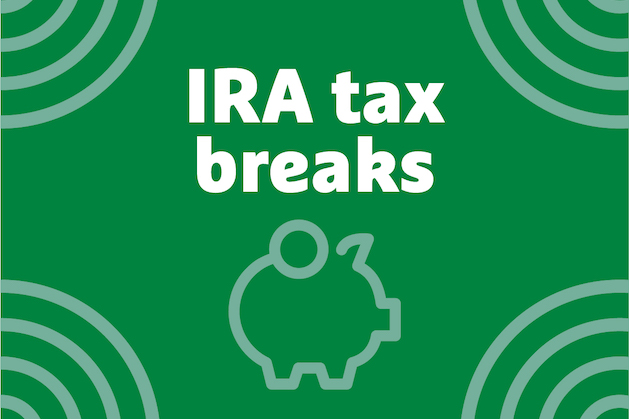- Personal
- Membership
- Membership
- Rates & Fees
- Checking
- Checking
- Personal Loans
- Personal Loans
- Wealth Management
- Investment Services
- Financial Advisors
- Resource Center
- Business

January 1, 2019
Looking for a Tax Break? Look at an IRA!
Yes, you certainly will pay taxes. But how much? Let’s say you open a Traditional IRA by December 31 of this year. Any contributions you make right up until April 15 may be tax deductible!
That’s the beauty of Individual Retirement Accounts. More money for you and less money for the tax man. It gets even better, because you won’t pay taxes on any qualified dividends you earn until withdrawal. Not so with other types of savings accounts.
Understanding IRAs.
Now, IRAs do have some complications, like contribution limits. Currently, the Internal Revenue Service caps annual contributions at $5,500. But if you’re 50 or over, that bumps up to $6,500. And if you make too much money, while that’s a nice problem to have, you may not qualify due to income restrictions.
Fortunately, most people can qualify for either a Traditional or a Roth IRA, both of which Grow offers. What’s the difference? Here’s a quick breakdown:
Traditional. Here, if you qualify, you may deduct contributions made during your working years,1 then pay taxes on your distributions in retirement. If you’re not enrolled in an employer-sponsored retirement plan like a 401k, this option may help reduce your annual taxable income.
Roth. Already enrolled in a 401k? Opening a Roth lets you add more to your retirement nest egg. Contributions aren’t tax deductible while you’re working, but once you retire,1 qualified distributions may be all yours, tax free!
Questions? Call 800.839.6328, ext. 2693.
Obviously, IRAs can get a little tricky. That’s why we have people who’ve earned certifications through an accredited training program offered to banks and credit unions. They can help you navigate the ins and outs and will answer your questions in plain language.
The bottom line of an IRA is simply this – it’s too good a deal to pass up. Visit any Grow store and open yours today!
Accounts are subject to approval.
*Certain restrictions apply. Not all taxpayers are eligible. Consult your tax advisor.
Posted In:
How to Find Your Routing & Account Numbers
When you make a payment online, by phone or on a mobile device, you may be asked for our routing number and your checking account number. Credit unions and banks use these numbers to identify accounts and make sure money gets where it’s supposed to be. You’ll also need to provide your routing and checking account numbers for:
- Direct deposits
- Electronic checks
- Military allotments
- Wire transfers
Where to Find Your Routing & Checking Account Numbers
Your personal checks include both our routing number and your account number, as shown on the Grow check example below.

Don’t have a Grow check? No worries.
Visit any Grow store and ask for a Direct Deposit Form. It lists both your routing number and checking account number.
Making a Loan Payment
When it comes to making payments, we try to make it as painless as possible to pay your loan every month. We have several different ways to pay, including convenient online options.
Pay Online
You have two ways to pay online by transferring funds from another bank or credit union.
- Grow Online Banking (Preferred payment method for any loan)
This is the simplest way to pay your loan. You can make one-time payments or set up automatic recurring payments in Grow Online Banking. Once you log in, select “Transfer/Payments” from the menu. If you’re not enrolled in Grow Online Banking yet, you can set up your account in just a few minutes.
Log In
- Debit Card or ACH (Available for auto, personal loans and HELOCs)
Note: ACH and debit card payments are not available for credit cards or most mortgages, except HELOCs.
We accept ACH payments with no additional fees or Mastercard® and Visa® debit cards with a convenience fee of $4.95. To get started with an online ACH or debit card payment, select Pay Now below.
Pay Now
Pay by Mail
You can also pay any Grow loan by check through the mail. Please remember to include your account number and Grow loan number on the check. (For credit card payments, please do not write your 16-digit credit card number on the check, which can cause a delay in processing the payment.)
Address for auto, credit card, personal loan and HELOC payments:
Grow Financial Federal Credit Union
P.O. Box 75466
Chicago, IL 60675-5466Address for personal first or second mortgages and home equity payments:
Grow Financial Federal Credit Union
P.O. Box 11733
Newark, NJ 07101-4733You Are About To Leave GrowFinancial.org
At certain places on this site, there are links to other websites. Grow Financial Federal Credit Union does not endorse, approve, represent, certify or control those external sites. The credit union does not guarantee the accuracy, completeness, efficacy, timeliness or accurate sequencing of the information contained on them. You will not be represented by Grow Financial Federal Credit Union if you enter into a transaction. Privacy and security policies may differ from those practiced by the credit union. Click CONTINUE if you wish to proceed.
